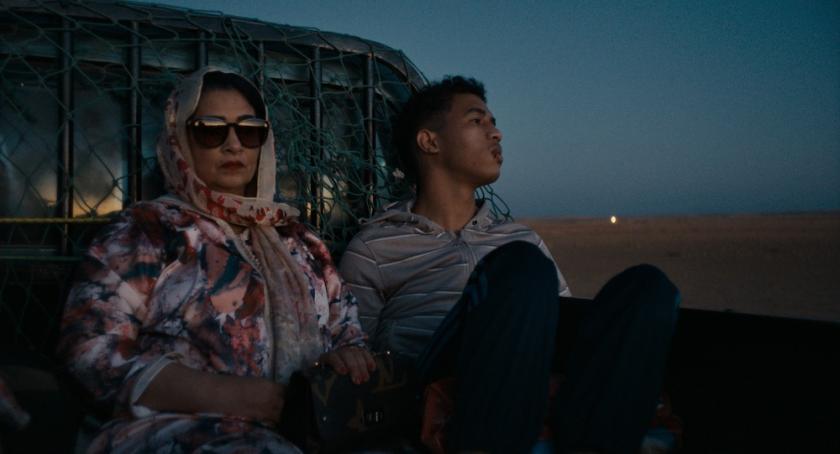British-Moroccan director Fyzal Boulifa’s second feature is a departure from his first, the brilliant and disturbing Lynn + Lucy of 2020. That was set on an Essex housing estate; this one takes place in Morocco.
Like Lynn + Lucy, it’s beautifully paced, outstandingly fresh and original, with some of the same themes of class, shame and identity, and takes its title from Vincent Sherman’s 1950 film noir starring Joan Crawford as a woman who claws her way out of poverty.
Boulifa follows a close-knit mother and son. Sleeping on the same small mattress, they're constantly on the move, barely getting by. They lug their enormous patterned plastic bags on to buses and trucks and end up in Tangier where they try, fitfully, to make a new start.
Both main characters are played by impressive first-time actors. Selim (Abdellah El Hajjouji) is the handsome teenage son of middle-aged Fatima-Zahra (Aicha Tebbae), whose red lipstick and thick layers of make-up serve as a kind of mask. Selim was the result of rape; Fatima-Zahra was shunned by her relatives when she kept him and had to turn to sex work to support them both, though she seems to believe that she’s actually a modern woman, too independent for her own good, too adventurous to fit into the traditional village mould. There are echoes of Boulifa’s acclaimed 2012 short, The Curse, based on his own mother’s experience, in which a Moroccan woman is shamed and persecuted for meeting her lover.
 Fatima may be delusional but she’s also brave, dogged and determined, an extraordinarily nuanced and appealing character. “People love to talk about me, it’s the story of my life,” she says with a coquettish smile. Selim knows that she's living in fantasy land. She’s told him that his father is dead, but he learns the truth when, having nowhere else to go after she’s robbed by a punter, they visit her hostile family, where one of her nieces is about to get married. There he overhears a bitter exchange about his paternity and her so-called career. They’re soon back on the road.
Fatima may be delusional but she’s also brave, dogged and determined, an extraordinarily nuanced and appealing character. “People love to talk about me, it’s the story of my life,” she says with a coquettish smile. Selim knows that she's living in fantasy land. She’s told him that his father is dead, but he learns the truth when, having nowhere else to go after she’s robbed by a punter, they visit her hostile family, where one of her nieces is about to get married. There he overhears a bitter exchange about his paternity and her so-called career. They’re soon back on the road.
Selim is furious and humiliated to learn that the interviews his mother is always putting on her face for are actually not interviews at all. “You’re sick in the head,” he tells her. But they’re too entwined for him to separate from her. In Tangier, hoping to support them both and keep her quietly at home, he finds concierge work at a luxurious riad owned by the wealthy, white Sébastian (Antoine Reinartz, pictured below with Selim), a gay Frenchman. There's an unsatisfactory plot thread involving Selim and a girl which goes nowhere, but perhaps that's the point.
At first it seems that Selim’s following in his mother’s footsteps. But Sébastian doesn’t just want sex; he’s a kind, apologetic man and wants to help Selim, showing him how to re-pot plants, helping him get an ID and inviting him to nightclubs. Selim looks on ambivalently, almost resentfully, at what the Christians get up to. But now he has something to hide from his mother, who disapproves of his gay associates. The shame continues down the line.
 Delusional as ever, Fatima-Zahra tells her son that she’s working for a big European clothing brand. This turns out to be piecework in a jeans factory, where they order her to wipe off her make-up. “Is your religion strong? Only our Creator can truly love us,” one of her co-workers tells her. Fatima looks sceptical but a seed is planted.
Delusional as ever, Fatima-Zahra tells her son that she’s working for a big European clothing brand. This turns out to be piecework in a jeans factory, where they order her to wipe off her make-up. “Is your religion strong? Only our Creator can truly love us,” one of her co-workers tells her. Fatima looks sceptical but a seed is planted.
Licking an ice-cream, she wanders down to the bus-station wearing a bright red djellaba with cut-away shoulders (she’d bought it for the niece’s wedding) and meets up with Moustapha (Moustapha Mokafih), a fine, upstanding bus driver. He’s religious, with a deeply depressed wife at home, and wants Fatima to become his second wife. She longs to be respectable and to be taken care of, and if that means joining Moustapha in prayer, so be it.
For a while it seems that both she and her son, who’s now caught between two worlds, have landed on their feet. But Selim, mired in jealousy and resentment, manages to scupper their chances and soon their world changes again. The film, beautifully shot by Caroline Champetier, ends abruptly, with Selim's future unclear, and leaves an indelible impression.















Add comment